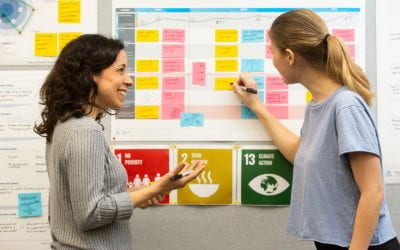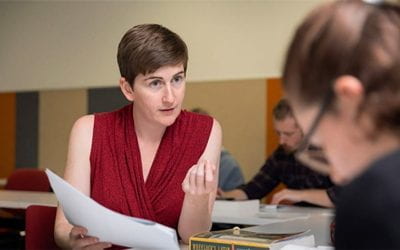Students with their (developing) selves
Students’ relationships with their developing selves are the transitional, growth, and self-determination skills they experience and build during their higher education.
Students will experience the transition into higher education in different ways. However, for almost all of them, moving from a familiar environment (e.g., high school) into an unfamiliar one can create uncertainty and instability.1 Research on student retention suggests that increasing self-efficacy, internalising locus of control, and empowering coping behaviours are necessary foundations for student success in higher education.2
Designing opportunities for self-reflection and self-evaluation can help students to monitor and regulate their own learning. This will enable students to have a greater awareness of their strengths and weaknesses, to set their own learning goals and to judge their progress against these goals.3 Building confidence and self-management skills will mean students can better adapt to different learning experiences and contexts.

Small steps
As teachers, we can design opportunities to help students build skills that develop a relationship with themselves as a learner. This can include:
Make space for students to self-assess their own work. As with peer assessment, this can help students gauge whether they are meeting the expected standards for a course and can help them better understand the criteria by which they are being assessed. This two-page guide from Herriot Watt University in the UK provides an excellent starter on how you can support students to self-assess their work.
Use technologies to support self-evaluation and reflection:4
- Online quizzes allow students to benchmark their understanding of a topic. These can be low-stakes assessments that help students prepare for larger tasks. In classroom settings, polling tools (e.g., Kahoot, Poll Everywhere) can perform a similar function.
- E-portfolios can provide a space for students to reflect critically on their learning.
- Discussion tools (e.g., Canvas Discussions, Perusall) can be used to create supportive spaces in which students can test their understanding of a topic and seek feedback from their peers or their teacher.
Encourage critical self-reflection by encouraging students to keep a journal of things that worked well, and things that didn’t go so well can help students to evaluate how they learn most effectively. Scotland’s Enhancement Themes website contains a set of slides for teachers and a self-reflection worksheet for students. Both of these can be adapted to your specific teaching context.
Help students to build academic resilience. Academic resilience is the “ability to tackle significant and adverse challenges that could negatively affect a student’s academic progress.”5 This two-minute video on how to build academic resilience is a great starting point.
Help to develop students’ evaluative judgement – the ability of learners to assess the quality of their own work (and that of their peers). A team at Deakin University has been researching how evaluative judgment can be fostered in students – this one-page overview provides a starting point for thinking how this can be achieved in practice.
Students with their (developing) selves in practice
Sprachwellen: Crafting German skills through podcasts and storytelling
Engaging students in creative exploration of German language and culture.
Teaching purpose-led design using innovative Design4Conservation methodology
Dr Gabriela Baron integrates various pedagogies, including relational, indigenous, TEL, and assessment-for-learning methodologies in DESIGN 233: Design and the Natural Environment.
Teaching law: Deepening students’ relationships with discipline, teacher and self
Jayden Houghton aims to make human connections with his students and encourages them to reflect on their values and their Law School experience.
Making classics and ancient history accessible, inclusive and relevant
Maxine Lewis discusses relationality in her teaching practice within Classics and Ancient History.
Page updated 13/10/2023 (minor edit)
- Jackson, Carolyn. “Transitions into higher education: Gendered implications for academic self-concept”. Oxford Review of Education 29, no. 3 (2010): 331-346. ↩
- Bean, John, & Eaton, Shevawn, B. “The psychology underlying successful retention practices”. Journal of College Student Retention 3, no. 1 (2001): 73-89. ↩
- Hawe, Eleanor, Lightfoot, Una, & Dixon, Helen. “First-year students working with exemplars: Promoting self-efficacy, self-monitoring and self-regulation”. Journal of Further and Higher Education 43, no. 1 (2019): 30–44. https://doi.org/10.1080/0309877X.2017.1349894. ↩
- Jisc. “Student self reflection”. (2015). Transforming Assessment and Feedback with Technology. Available: https://www.jisc.ac.uk/guides/transforming-assessment-and-feedback/self-reflection. ↩
- Martin, Andrew, J. & Marsh, Herb, W. “Academic resilience and its psychological and educational correlates: A construct validity approach”. Psychology in the Schools 43, no. 3 (2006): 267–281. ↩




